Proper home boiler maintenance is crucial to ensure it operates efficiently and safely. By following these 7 essential boiler maintenance tips, homeowners can prevent costly repairs and extend the lifespan of their boiler.
- Annual Inspections: Schedule a professional boiler servicing annually to check for any wear and tear and ensure it operates optimally.
- Regularly Clean the Boiler: Keep the boiler clean from dust and debris to prevent clogs and improve its efficiency.
- Check and Replace Filters: Dirty filters can restrict airflow and affect performance, so be sure to check and replace them regularly.
- Boiler Pressure: Monitor the pressure and adjust it if necessary to maintain the correct level for efficient operation.
- Bleed Radiators: To ensure even heat distribution, bleed the radiators to release trapped air that can cause cold spots.
- Insulate Pipes: Insulate the pipes to prevent heat loss and improve energy efficiency.
- Warning Signs and Address Issues Promptly: Be vigilant for warning signs of potential issues and address them promptly to prevent further damage.
By following these simple boiler maintenance tips, homeowners can ensure it operates effectively and safely for years to come.
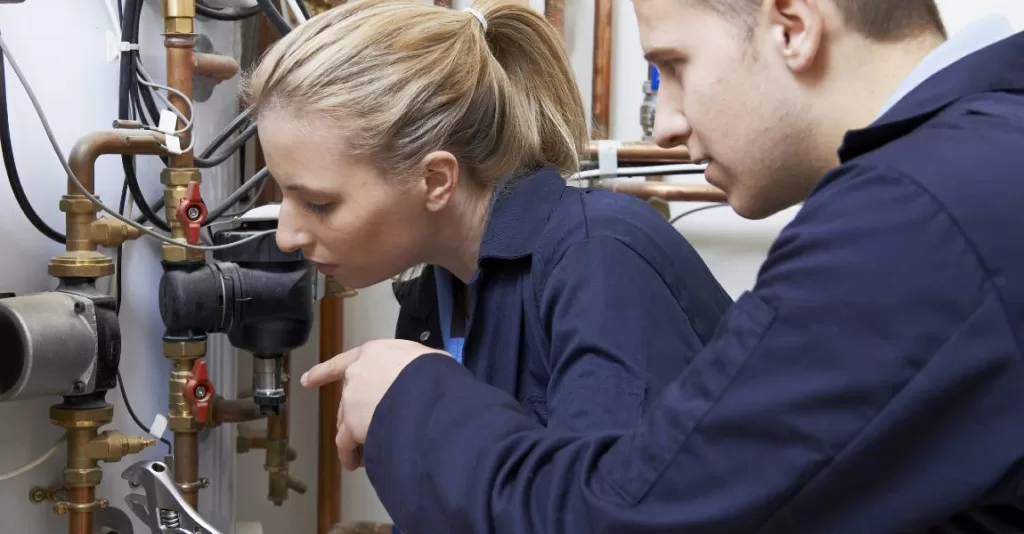
Table of Contents
What is Boiler Maintenance?
Boiler maintenance is regularly servicing and maintaining a boiler system to ensure it functions efficiently and safely. This typically involves inspecting and cleaning the various components, checking for any signs of wear or damage, and addressing any necessary repairs or replacements.
For homeowners and business owners, regular boiler maintenance is crucial, especially during the cold winter months when it is relied upon to provide heating. Neglecting boiler maintenance can lead to reduced efficiency, higher energy bills, and an increased risk of breakdowns, leaving occupants without heat when needed.
The type of boiler also plays a role in maintenance requirements, as different types, such as combi boilers, system boilers, and regular boilers, may have unique maintenance needs.
It is important for homeowners and business owners to ensure that their specific type of boiler is properly maintained according to manufacturer guidelines.
Overall, boiler maintenance is essential for ensuring the longevity and effectiveness of the heating system, as well as the comfort and safety of the occupants.
What are the Benefits of Regular Boiler Maintenance?
Regular boiler maintenance provides numerous benefits for both residential and commercial properties. Firstly, it helps to ensure peak efficiency, reducing energy consumption and ultimately leading to cost savings on utility bills. By keeping it running efficiently, property owners can also avoid costly repairs and prolong the system’s lifespan, ultimately increasing the property value.
Regular maintenance ensures the property’s and its occupants’ safety. Faulty units can pose serious health risks, such as carbon monoxide leaks, which can be avoided through routine inspections and maintenance.
A well-maintained system provides a comfortable living or working environment, as it can effectively regulate temperature and provide reliable heating throughout the property.
Regular boiler maintenance is essential for residential properties to safeguard the health and well-being of the occupants. It’s also crucial for commercial properties to maintain optimal working conditions and meet safety regulations.
Investing in regular boiler maintenance is a proactive approach to save money and energy and prioritize the safety and comfort of the property and its occupants.
1. Schedule Annual Boiler Inspections
Scheduling annual inspections is crucial to the maintenance and efficiency of your heating system. To start, you can contact a qualified HVAC technician to schedule a professional service. It is recommended to set a date for the inspection in the fall before the colder winter months begin. This ensures that any necessary maintenance can be addressed.
Regular inspections are important for extending the lifespan, preventing breakdowns, and saving energy costs.
During an annual inspection, the technician will check for potential issues, clean the components, and ensure that everything functions efficiently. This proactive approach can catch small issues before they turn into costly boiler repairs or result in a complete breakdown.
By scheduling regular annual maintenance, you can also ensure that it is is operating at its peak efficiency, saving you money on energy costs in the long run. In addition to the annual inspection, it is important to keep up with regular appointments for maintenance to maintain the efficiency and longevity.
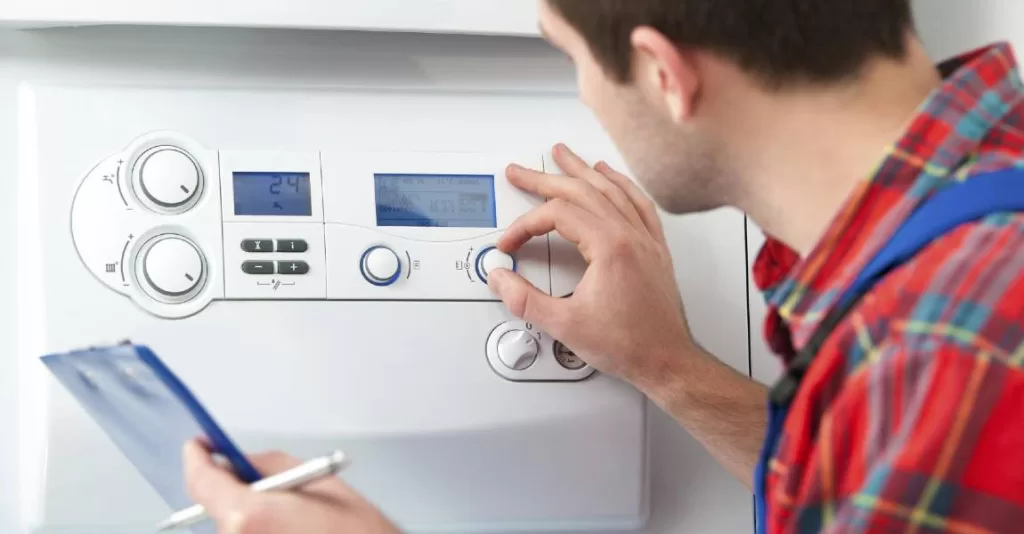
Why are Annual Inspections Important?
Annual inspections are essential for maintaining the efficiency and safety of the unit These inspections can help identify and address potential issues before they escalate into costly emergencies, ultimately saving time and money for the property owner.
During a thorough annual inspection, key components such as checking for leaks, testing pressure levels, and ensuring proper ventilation is crucial in ensuring the optimal performance. Identifying and addressing any issues early on can prevent the need for emergency service and costly repairs down the line.
Regular inspections can also help ensure the property’s and its occupants’ safety. A malfunctioning system can pose serious risks to the safety and health of a family, and regular inspections can help prevent such dangers.
By conducting regular annual inspections, property owners can ensure the longevity and efficiency while keeping their families safe. The annual inspections are important for the efficiency and the safety and well-being of those living on the property.
How to Find a Professional Inspector
To find a reputable HVAC company in your area for an annual service and visual inspection start by researching certified professionals. Look for companies with proven experience and positive customer reviews. Ask for recommendations from friends, family, or colleagues who have had similar services done.
When contacting HVAC companies, inquire about their certification and experience examining heating systems. Ensure that the technician they send can thoroughly inspect the system, including checking the heat exchanger and wiring and cleaning all the pipes. Finding a technician to examine the vent system and make any necessary adjustments for proper airflow is also important.
Make sure to schedule the service well before the winter season begins to avoid any unexpected issues with your heating system.
Taking this simple step to regularly maintain it can help prevent costly repairs and ensure that your heating system operates efficiently throughout the colder months.
What to Expect During an Inspection
During a boiler maintenance check; an HVAC engineer will inspect key components, such as it’s age, any visible damage or wear and tear, and the emissions levels, to ensure it operates efficiently and safely. They will also check for any signs of carbon monoxide leaks and ensure the carbon monoxide detector is functioning properly.
Booking repairs early is important as it can save money in the long run. Small issues can quickly escalate into major problems if left unattended, leading to costly repairs or needing a full boiler replacement.
Missing annual inspections can have severe consequences, including voiding the boiler warranty. Regular maintenance is often a requirement to keep the warranty valid, so failing to schedule annual inspections could result in having to cover the cost of any necessary repairs or replacements out of pocket.
It’s crucial to prioritize annual boiler service and inspections to ensure safety and efficiency, as well as to maintain warranty coverage. By catching and addressing issues early, homeowners can save money on costly repairs and potentially dangerous situations.
2. Regularly Clean Boiler
Regularly cleaning is essential to prevent a buildup of dust and debris, which can lead to decreased efficiency and potential damage to the heating system.
It is recommended to contact a professional plumber or technician to clean the inside, as they have the expertise and equipment to do the job safely and effectively.
Regular cleaning will help prolong the life of your heating system, ensuring that it operates efficiently for many years.
Investing in regular boiler maintenance, you can prevent dust buildup and maintain the optimal performance, ultimately saving you money on energy bills and costly repairs.
Trusting a professional technician to clean it regularly can extend its life span and keep your home warm and comfortable.
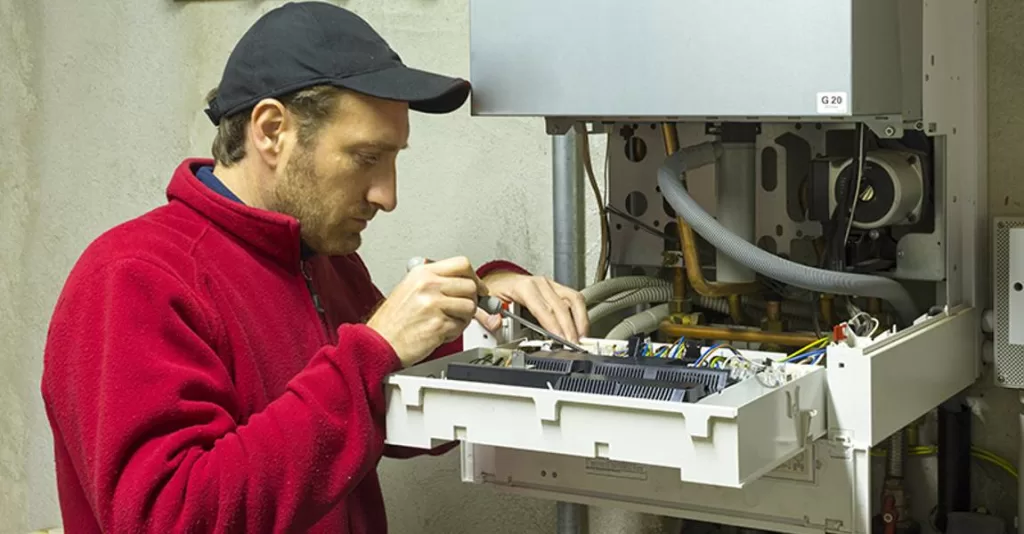
Cleaning Boiler to improve efficiency
Cleaning it is essential to improve its efficiency and prolong its lifespan. Start by regularly cleaning the exterior and surrounding area to prevent blockages from debris and dust. This will ensure that airflow is not restricted, allowing it to function at its best.
Monitoring the water pressure regularly is also important to ensure it remains optimal for efficient operation.
Insulating it and pipework can also significantly improve efficiency and reduce energy consumption. This prevents heat loss and ensures that it operates at maximum efficiency. This can be achieved by adding insulation material to the system itself and the associated pipework.
To maintain optimal performance, getting professional service at least once a year is crucial. A trained technician can thoroughly clean the boiler’s internal components, check for any potential issues, and make necessary adjustments. They can also inspect the access panel and ensure everything is working well.
By following these steps, the efficiency can be improved and its lifespan prolonged, saving energy and money in the long run.
3. Check and Replace Filters Regularly
To ensure optimal performance, checking and replacing the filters regularly is important. Checking the filters monthly for debris and rust is crucial in maintaining the functionality.
Clean the filters with a high-powered sprayer to eliminate buildup, especially during the coldest winter months when it is used more frequently.
Check the filters, locate them on the unit, and visually inspect for any debris or rust. If you notice any buildup, it is essential to clean the filters immediately to prevent any blockages or damage to the system. If the boiler filters are beyond cleaning, replace them with new ones to ensure proper functionality.
Regular maintenance of the boiler filters is essential for the overall maintenance of the system. This simple step can help prevent potential issues and ensure efficient operation. Following these steps and conducting regular checks, you can prolong the life and ensure it operates at its best.
Maintaining Optimal Airflow and Preventing System Malfunctions
Clean filters are essential for maintaining optimal airflow and preventing system malfunctions in heating and cooling systems. Filters should be rust-free and debris-free to ensure air can flow easily through the system.
It’s important to replace furnace filters every month during the winter when the system is in frequent use and every three months when not in use.
HRV filters should also be cleaned every 3 or 4 months to ensure proper airflow. By maintaining clean filters, the system can operate at its best and reduce the risk of breakdowns.
4. Monitor Boiler Pressure
Regularly monitoring boiler pressure is crucial for maintaining the efficiency and safety of a boiler system.
The pressure gauge on it provides a quick and easy way to check the pressure level.
It’s important to regularly check the pressure gauge and record the pressure at set intervals to ensure it stays within the recommended range. This not only helps prevent potential damage but also ensures that it operates at its optimum efficiency.
Maintaining the correct boiler pressure can also provide evidence for warranty claims, as many manufacturers require proof of regular maintenance and pressure checks to uphold the warranty.
With professional services, you can keep track of maintenance and ensure the it is in good working condition.
Keeping an eye on the boiler pressure level helps identify any issues with the system, such as leaks or faulty pressure release valves, which can lead to inefficiency or potential safety hazards.
Monitoring the pressure also helps identify if the boiler flue is operating correctly, ensuring it is safely expelling harmful gases. Regularly monitoring and recording boiler pressure is essential for a boiler system’s safe and efficient operation.
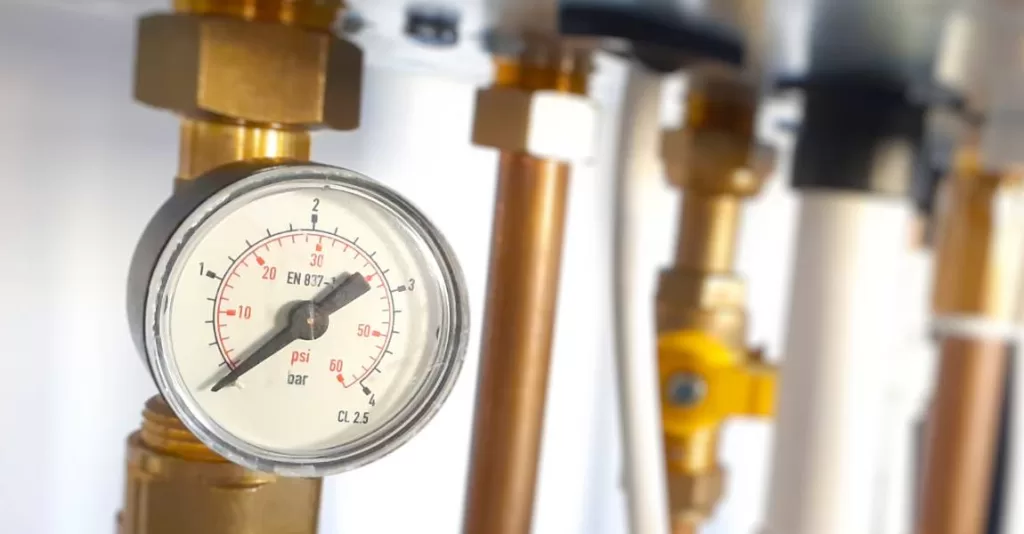
Ideal Boiler Pressure Range
The ideal boiler pressure range is typically between 1 and 1.5 bar. Maintaining this range is important for the efficient operation of the heating system. If the boiler pressure is too low; it can result in inadequate heating and hot water and potential damage to the boiler due to overheating. If the boiler pressure is too high, it can lead to leaks, increased energy consumption, and even damage internal components.
It’s crucial to regularly check the boiler pressure and adjust it as necessary to keep it within the ideal range. This can be done by following the manufacturer’s guidelines for re-pressurizing the boiler or seeking the assistance of a professional heating engineer. Maintaining the correct boiler pressure ensures that the system operates effectively, efficiently, and safely.
Keeping the boiler pressure within the recommended range is vital for properly functioning the heating system. It can help prevent damage to the unit ensure consistent warmth and hot water throughout the home, and ultimately extend the heating system’s lifespan.
5. Bleed Radiators
To bleed your radiators, start by turning off the heating system to allow the radiators to cool down.
Locate the radiator bleed valve, usually found at the top of the radiator.
Use a radiator bleed key to slowly turn the valve anticlockwise, listening for hissing sounds as the air pockets are released.
Be sure to have a cloth or some paper towels handy to catch any water that may leak out.
Once you’ve bled all the radiators, check the boiler pressure and top it up if necessary.
To determine if you’re bleeding your radiators, please check for cold spots, indicating trapped air preventing proper heating.
Listen for gurgling noises when the heating is turned on, as this could also indicate air pockets.
If you notice these signs, it’s a good indication that bleeding the radiators will improve their performance and ensure efficient heating throughout your home.
6. Insulate Pipes
To improve efficiency and prevent heat loss, insulating pipes, and the boiler is essential.
Start by using foam insulation or pipe wrap to cover any exposed pipes. This will help maintain the pipes’ heat and reduce energy waste. Ensure that the unit itself is properly insulated to prevent heat from escaping.
Insulating pipes and the unit significantly improve the heating system’s efficiency. The system can operate more effectively by reducing heat loss, saving energy, and lowering heating costs. It also helps to prevent pipes from freezing during colder months.
To effectively insulate pipes, measure the diameter of the pipes and acquire the appropriate foam insulation or pipe wrap. Wrap the insulation around the pipes, ensuring a secure and tight fit to minimize heat loss. Consider using specialized insulation for the boiler to cover the unit and prevent heat from escaping.
Insulating pipes and the boiler is a simple yet effective way to improve the heating system’s efficiency, reduce energy waste, and lower heating costs.
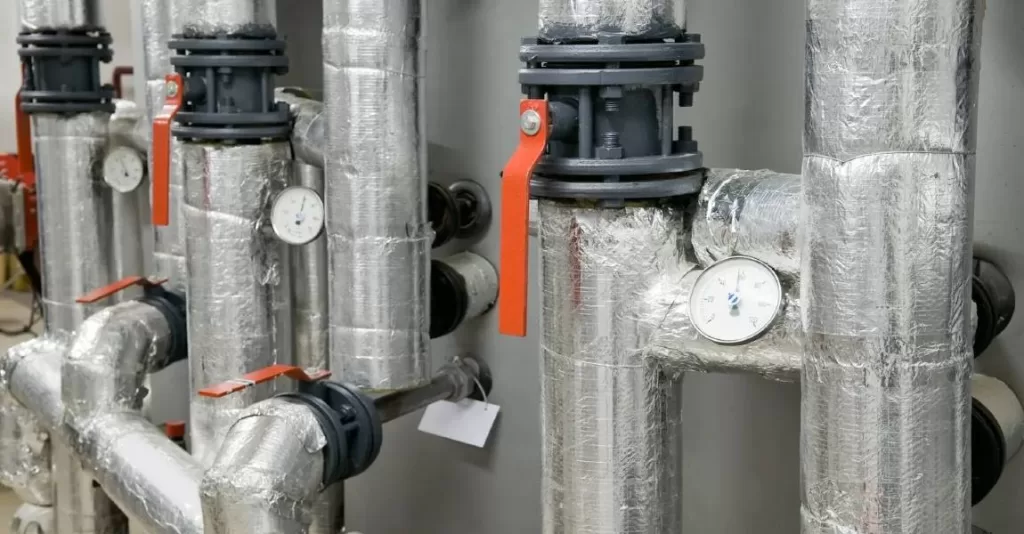
DIY Instructions for Pipe Insulation
Pipe and boiler insulation is essential for maintaining the effectiveness and safety of your heating system. To insulate your external pipes and the unit you will need insulation material such as fiberglass or foam sleeves, aluminum foil tape, and gloves for handling the materials.
- To insulate the pipes, cut the insulation material to the length of the pipes and wrap it around them, securing it with aluminum foil tape.
- For the boiler, wrap the insulation material around its body and secure it with tape. Ensure that all exposed pipes and the boiler are adequately covered to prevent heat loss and improve energy efficiency.
Proper insulation is important for preventing heat loss, reducing heating bills, and ensuring the safety of your heating system.
Routinely check the insulation for any holes or weak spots, as damaged insulation can lead to heat loss and decreased efficiency.
Regular maintenance and checks will help identify any issues with the insulation early on, preventing potential safety hazards and ensuring the effective operation of the heating system.
Following these DIY instructions and conducting routine checks, you can keep your pipes and boiler properly insulated for optimal performance.
7. Be Aware of Warning Signs and Address Issues Promptly
Regularly monitoring for warning signs such as leaks, unusual noises, and issues with the pilot light.
Leaks can indicate a problem with the internal components, while unusual noises like banging or whistling may signal trapped air or a faulty pump.
A pilot light that frequently goes out or changes color to a blue flame could indicate a lack of oxygen or a combustion problem.
If you notice any of these warning signs, it’s very important to address them promptly to prevent further damage.
Taking action early can save you from costly repairs or replacements down the line. Contact a professional as soon as possible to assess and address the issue.
By being proactive and monitoring regularly for these warning signs, you can ensure that it continues to operate safely and efficiently. Don’t ignore any potential issues, as they could worsen over time. Stay vigilant and address any warning signs promptly.
How to Troubleshoot Minor Issues
Suppose you experience minor issues, such as automatic shutdown, leaking pipes, delayed heating, extinguished pilot light, or loud noises. In that case, you can take a few steps to troubleshoot boiler problems.
Check for leaks around the heat exchanger and monitor any unusual increases in your monthly heating bills. If the issues persist or worsen, it’s time to seek professional help.
Boiler maintenance is crucial in preventing minor issues from turning into major problems. Regular maintenance and inspection can help identify and fix issues before they become more serious.
If you need help troubleshooting or resolving minor issues, it’s best to consult a professional. They have the expertise and knowledge to diagnose and fix any problems.
Promptly addressing minor issues can save you from costly repairs or replacements. Don’t ignore any signs it is not functioning as it should.
FAQ’s
How often should I service my boiler?
The frequency of servicing depends on factors such as its age, usage, and manufacturer recommendations, but it is generally recommended to be serviced annually.
Can I perform maintenance myself?
Yes, you can perform maintenance yourself, but it is recommended to have a professional inspect and service annually to ensure its proper functioning and safety.
What are the consequences of neglecting boiler maintenance?
Neglecting maintenance can lead to reduced efficiency, increased energy costs, potential breakdowns, safety hazards, and shortened lifespan.
Are there any specific safety precautions to follow during boiler maintenance?
Yes, there are specific safety precautions to follow during maintenance, such as wearing protective clothing, ensuring proper ventilation, and shutting off power to the unit before starting maintenance activities.
Conclusion
Regular maintenance of heating systems is crucial for ensuring their efficient and safe operation. Neglecting maintenance can lead to various potential consequences, including decreased heating efficiency, higher energy bills, and even carbon monoxide poisoning.
It can also result in costly breakdowns, repairs, and a shortened lifespan for the heating system.
While homeowners can handle some maintenance tasks, such as regularly changing air filters, technical issues should always be left to experts. Professional maintenance is essential for identifying and addressing any potential issues before they escalate into major problems.
At JD’s Plumbing, Heating, and Air Conditioning, our team of experts is well-equipped to provide professional maintenance and repairs for all types of heating systems.
We understand the importance of regular maintenance and are dedicated to ensuring the safety and efficiency of your heating system.
Contact us today to schedule a maintenance service and prevent any potential consequences of neglecting your heating system. Don’t wait until it’s too late – trust JD’s for all your heating system needs.





